UN Water Action Decade

Water is the basis for all life and an indispensable resource. We rely on water for our food supply and our daily hygiene. Water serves as a habitat for many plant and animal species in the form of oceans, lakes, rivers or wetlands. And people need water for leisure activities. Water is also an important economic factor as an energy source, a means of transport and a raw material. Access to clean water in sufficient quantities is essential for our health and diet. This makes water one of our most important resources. And we need to make sure we protect it.
Key goals of the International Water Action Decade
Access to water is a human right. To tackle the global challenges associated with guaranteeing this right, the UN Water Action Decade was proclaimed at the 66th General Assembly of the United Nations. The UN Water Action Decade started on 22 March 2018 and ends on 22 March 2028. It pursues two main goals:
- to improve knowledge sharing related to water and water pollution control, including information on the water-related Sustainable Development Goals (SDGs) outlined in the 2030 Agenda for Sustainable Development
- to improve communication to achieve the water-related SDGs
Like all other member states, Germany is called on to support the UN Water Action Decade and to work to ensure the sustainable management of water resources and water bodies through campaigns and initiatives designed to provide information, education and training.
Activities of the German government in the context of the UN Water Action Decade
In Germany, the Federal Ministry for the Environment, Nature Conservation, Nuclear Safety and Consumer Protection (BMUV) is responsible for fundamental aspects of water management and cross-border cooperation on water issues. The BMUV has lead responsibility for relevant legislation, including the Federal Water Act, the Waste Water Charges Act, the Washing and Cleansing Agents Act, the Soil Protection Act and the Federal Nature Conservation Act. Against the backdrop of the UN Water Action Decade, the German government is committed to sustainable management practices for water resources and water bodies.
National implementation of the UN Water Action Decade focuses not only on strengthening water policies, but also on education, communication and raising public awareness of water issues. The National Water Dialogue and the citizens’ dialogue on water were also placed within the framework of the UN Water Action Decade. The outcomes of these dialogue processes provided important impetus for the development of the National Water Strategy, which was adopted by the Federal Cabinet on 15 March 2023. One of the strategic issues of the National Water Strategy focuses on working together to protect global water resources.
At global level, the focus is on protecting water ecosystems from overuse and pollution, and on the human right to water. As part of these efforts, the BMUV has launched the Water Dialogues for Results.
The BMUV’s logo for the UN Water Action Decade
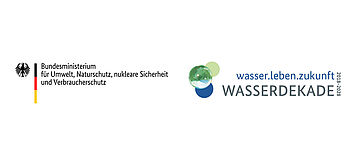
If you are involved or plan to get involved in the UN Water Action Decade and would like to use the BMUV’s logo for your own project, please do not hesitate to contact us.
Or get in touch with your questions or ideas for our campaigns and projects, such as the National Water Dialogue or the National Water Strategy. Please use the contact form provided for this purpose.
Activities of the Federal Environment Ministry under the UN Water Action Decade
The BMUV is involved in a variety of activities under the UN Water Action Decade, some of which are listed below.
UN 2023 Water Conference
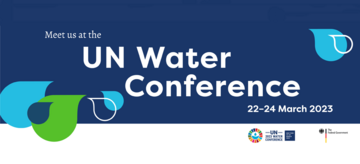
From 22 to 24 March 2023, the second UN Water Conference will take place in New York City at the headquarters of the United Nations. The aim of the conference is to take stock of the progress achieved to date under the UN Water Action Decade and on the implementation of the water-related goals of the 2030 Agenda for Sustainable Development, particularly SDG 6, "Clean Water and Sanitation". In addition, it aims to identify ways to speed up implementation. The idea behind the planned Water Action Agenda is to provide a platform that pools voluntary commitments and proposals for initiatives and activities by a host of different stakeholders, from national governments and multilateral organisations to civil society groups.
The German government also supports the call by some 150 member states for the Secretary-General to appoint a UN Special Envoy on Water. This envoy would be tasked with seeking to mobilise political support and more resources within and beyond the UN system, including more efficient management of those resources, for overcoming challenges in the water sector.
In addition, the German government will launch its own initiatives under the Water Action Agenda. In its National Water Strategy, adopted on 15 March 2023, the German government outlines what steps need to be taken in Germany over the coming years to ensure that water resources are protected and the public water supply can be guaranteed in the long term as well.
National Water Strategy and national water dialogues
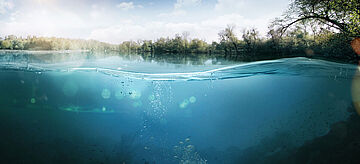
Water is the basis for all life. We must set the course today for more sustainable and adapted water use in the future to address the challenges of climate change, technological innovations and the diverse stresses on the water cycle caused by our lifestyles and interventions in water systems. The National Water Strategy aims to usher in and guide a new era of transformation in the water sector. To facilitate the development of the first draft of the strategy, the BMUV initiated a stakeholder process, the National Water Dialogue and the national citizens’ dialogue on water. This made it possible for key input to be incorporated into the draft right from the outset.
The BMUV’s draft of the National Water Strategy, which was presented at the Third National Water Forum on 8 June 2021, seeks to answer the question of how to guarantee the water supply for humans and the environment in sufficient quantity and the necessary quality by 2050. Subsequently, many other comments and insights from the Länder and associations were incorporated into the draft.
On 15 March 2023, the Federal Cabinet adopted the National Water Strategy including a programme of measures consisting of 78 specific actions. These measures will be gradually implemented until 2030. Every six years, the status of implementation will be evaluated and the strategy updated if necessary. An interministerial working group representing all the competent ministries will coordinate the implementation process.
2021 International Water Conference
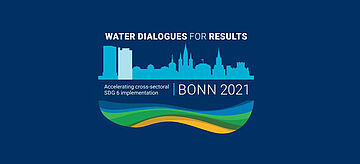
With a view to accelerating implementation of SDG 6 of the 2030 Agenda, “Water and Sanitation for All”, the BMUV launched a series of Water Dialogues for Results within the framework of the UN Water Action Decade. From February to July 2021, an international dialogue process was conducted in close cooperation with UN member states from the Global North and Global South as well as representatives from various international organisations in the fields of policymaking, business and civil society. Experts from a variety of disciplines participated in a series of discussion platforms dedicated to specific issues and regions to develop policy messages proposing calls to action at national, multilateral and UN level.
A high-level International Water Conference held on 1 July 2021 officially concluded the Water Dialogues for Results. The conference aimed not only to further dialogue among UN member states on SDG 6 and its implications for other key sectors of sustainable development, but also to draft strategic recommendations for action for UN decision-making processes. These international activities aim to harness the momentum of the UN Water Action Decade with a view to encouraging changes in global water management. The political messages elaborated in this process will inform the German contribution to the 2023 UN Water Conference, where an interim assessment of the UN Water Action Decade will take place.
Logo for drinking fountains
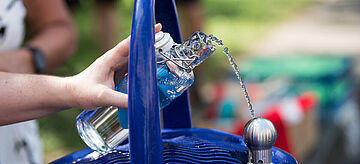
Trinkwasserbrunnen in Berlin
Germany is a country with abundant water resources. Drinking water is the most essential nutrient to sustain life and is available in excellent quality in Germany. Strict controls at regular intervals ensure a supply of safe drinking water.
The BMUV supports the availability of free drinking water in public spaces, for example by allowing the BMUV’s logo for the UN Water Action Decade to be displayed on public drinking fountains.
Campaign "Don't give nature your leftovers"

Kampagnenmotiv "Gib der Natur nicht den Rest."
Medicine is invaluable for our health. It helps us recover from illness or stay in good health. At the same time, the active ingredients in medication can end up in the environment. Improper disposal of old or leftover medicines down the sink or toilet also helps medicines find their way into the environment. The good news is that it is easy to dispose of medicine correctly. This protects our rivers and lakes as habitats for animals and is an additional resource for our drinking water. The Federal Environment Ministry is raising awareness in its information campaign "Don’t give nature your leftovers. Dispose of medicines properly." You can find an overview in the respective brochure.
Campaign "No to the throwaway society"
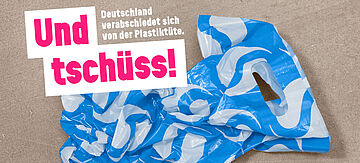
Plastic waste is harmful to humans and the environment. It pollutes our rivers and beaches, floats on the surface of our seas or lurks at the bottom of our oceans and harms aquatic life in a number of different ways. We can find it almost everywhere: in densely populated areas of the world but also in sparsely populated regions like the Arctic.
In this part of the world, we still use around 3,000 plastic bags each minute. That is why the Federal Cabinet, at the suggestion of the Federal Environment Ministry, has paved the way for a ban on plastic bags. The goal of this and other measures is to reduce superfluous plastic.
